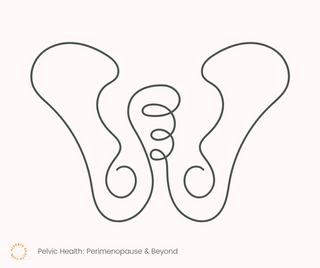At Aleenta Health Club, we often touch on topics about our physical health, however, mental health is an equally important part of our wellbeing. It can be uncomfortable to talk about our mental health struggles: they are oftentimes painful and stigmatised, and we never know what reaction we are going to get by opening up about disorders that can’t always be ‘seen’. We aim to foster a safe and welcoming environment at Aleenta, whether that’s in-studio or online, and as a writer (and previous Instructor) for Aleenta, I’d like to set an example by honestly sharing my struggles.
Not long ago, I opened up about my personal struggle with Polycystic Ovarian Syndrome (PCOS). An 8-year-long battle with my reproductive health that is still ongoing, I always considered my PCOS entirely separate from my other health struggles. In that blog (which you can read here), I talked about the lack of information provided by doctors to their PCOS patients, and that more often than not we have to do our own research. So, I was falling down one of my usual research rabbit holes when I found countless studies that shocked me to my core: there is an undeniable link between PCOS and mental health. I had never seen these findings discussed in the online PCOS community, let alone by my doctors! How could this be when it seems incredibly important for fellow PCOS patients to know, and can open windows into our mental health? I know personally this information has given me immense clarity when it comes to my own mental health struggles, and I’m hoping by sharing it may also help you.

There are 4 studies I’d like to focus on here, because they are the most recent. But there are years of additional research prior to these with similar findings. Please be aware the following studies do contain discussions of mental health and suicide.
- A 2016 Swedish study found PCOS patients have a 50% increased chance of having a psychiatric disorder.
Researchers gathered data from the Swedish National Registers over a 23-year period, identifying members of the population with a PCOS diagnosis, as well as their unaffected family members (this will be important later). Of all the psychiatric diagnoses, bulimia, schizophrenia, bipolar disorder, depressive and anxiety disorders, personality disorders and autism were all found to be significantly higher for those with PCOS; attempted suicide was also 40% higher. Additionally, this study found that the unaffected family members of these individuals also had an increased risk for psychiatric disorders, indicating a genetic link between PCOS and mental health.
- A 2018 study published by the Endocrine Society links PCOS with adverse mental health and neurodevelopmental outcomes.
16, 986 patients with PCOS were compared to a control group (people without PCOS). Researchers found:
- Depression affects those with PCOS at a rate of 23.1% compared to those without (19.3%)
- Anxiety affects those with PCOS at a rate of 11.5% compared to those without (9.3%)
- Bipolar disorder affects those with PCOS at a rate of 3.2% compared to those without (1.5%)
- The children of those with PCOS have higher instances of Autism and Attention Deficit Hyperactivity Disorder (ADHD)
- A 2015 study in India found a higher prevalence of major depressive disorder, panic disorder and generalised anxiety disorder in people with PCOS.
A group of 110 people with PCOS were compared to a control group of 40 individuals selected to match the age and body mass index (BMI) of the primary group.
“About 23% of cases had major depressive disorder as compared to 7.5% of controls, 1.8% had dysthymia, 15.45% had panic disorder compared to 5% of controls, 6.36% had obsessive compulsive disorder compared to 2.5% of controls, 8% cases had suicidality, 2.72% of cases were bipolar affective disorder, and 15.45% had generalised anxiety disorder (GAD).”
- A 2017 study found a link between estrogen levels and the formation of Post-Traumatic Stress Disorder.
Researchers from Emory University School of Medicine in Atlanta, GA, and Harvard Medical School in Massachusetts, discovered that the HDAC4 gene, part of the brain’s fear response, is affected by estrogen levels. Although the study was only done in mice, it shows potential for estrogen being used as a preventative treatment for PTSD:
“The mice experiments revealed that when estrogen levels were low, the HDAC4 gene expression was higher, but the same regulation was not present when estrogen levels were high. The HDAC4 was activated when the mice were fear learning, but only when estrogen levels were low.”
What does this have to do with PCOS? PCOS is characterised by hyperandrogenism (elevated androgen levels such as testosterone), and consequently, a lower amount of estrogen and progesterone. This is what can cause the higher rates of infertility in those with PCOS, but with the new findings of this study, it could also reveal a link between rates of PTSD in PCOS patients. Of course, this does require further research, but it is something to think about.
What can we take away from these studies?
It’s unclear whether the increased prevalence of mental health disorders in those with PCOS is due to the interaction of elevated androgen in the body (as study 4 suggests), or the social consequences of PCOS. Many of these researchers indicate that the symptoms themselves, such as hirsutism, obesity and male-patterned baldness, can be emotionally distressing. Therefore, it could be these symptoms that in turn lead to psychiatric problems, whether as a result of self-image or bullying from others. More research is needed to determine the underlying cause; however, all of these studies conclude that doctors should be monitoring the mental health of their patients with PCOS, and providing this information upon diagnosis. Just as knowing about a genetic predisposition to cancer can help with early diagnosis and prevention, having the knowledge of predisposition to mental health problems can not only help us on our own mental health journey, but our families as well (as studies 1 and 2 suggest). If you or a family member has PCOS, it may be beneficial to talk to your doctor about your mental health. I know I personally could have benefited from this information 8 years ago.
I have struggled with my mental health for over a decade, however, as a child it is easy to be dismissed. After all, when you’re going through puberty, doctors and family members alike can attribute problems to hormonal changes and growing pains; which of course, can be the case. I endured much of my teenage years and early adulthood thinking I was crazy and that my problems were not real. Being dismissed by the very people who are supposed to help you makes it incredibly hard to seek help. It’s been a long journey, but I’m so proud to say that in 2022 I finally got the help I needed. I’ve started going to therapy among other things, and have been diagnosed with anxiety, depression and PTSD. I still have struggles I want to address, but the important thing is that I have started my healing journey. I share this because I want you to know that healing is possible, and you can seek help. You are not crazy.
Had my doctor that diagnosed my PCOS also shared that I may be at risk for mental health problems, my life may have been different… But, I can’t go back and change the past. The point is I have this information now, and I can use it to the betterment of my health; and so can you.

If you or someone you know is struggling with their mental health, utilise or share these resources:
- headspace (for people aged 12 to 25 and their families) — call 1800 650 890 or chat online
- Beyond Blue (anyone feeling depressed or anxious) — call 1300 22 4636 or chat online
- Black Dog Institute (anyone affected by mood disorders) — online help
- SANE Australia (people living with a mental illness) — call 1800 18 7263 or chat online
- This Way Up (anyone with stress, anxiety and depression) — online courses
- MindSpot (people with anxiety and depression) — call 1800 61 44 34 or complete an online screening assessment.
- https://www.healthdirect.gov.au/australian-mental-health-services
Written by Sascha Czuchwicki
Works Cited
E.Cesta, Carolyn and et al. "Polycystic ovary syndrome and psychiatric disorders: Co-morbidity and heritability in a nationwide Swedish cohort." Psychoneuroendocrinology 73 (2016): 196-203.
Health Direct. Australian mental health services. February 2022. 28 August 2022. <https://www.healthdirect.gov.au/australian-mental-health-services>.
Hussain, Arshad and et al. "Prevalence of Psychiatric Disorders in Patients with a Diagnosis of Polycystic Ovary Syndrome in Kashmir." Indian Journal Of Psychological Medicine 37.1 (2015): 66-70.
Sandoiu, Ana. Estrogen regulates the brain's fear response, protecting against PTSD. 22 January 2017. 28 August 2022. <https://www.medicalnewstoday.com/articles/315383>.
Thomas R Berni, Christopher L Morgan, Ellen R Berni, D Aled Rees. "Polycystic Ovary Syndrome Is Associated With Adverse Mental Health and Neurodevelopmental Outcomes." The Journal of Clinical Endocrinology & Metabolism 103.6 (2018): 2116-2125.
S. A. Maddox et al., Molecular Psychiatry, doi:10.1038/mp.2016.250, published online 17 January 2017. Emory Health Sciences , accessed 28 August 2022 via MedicalNewsToday






